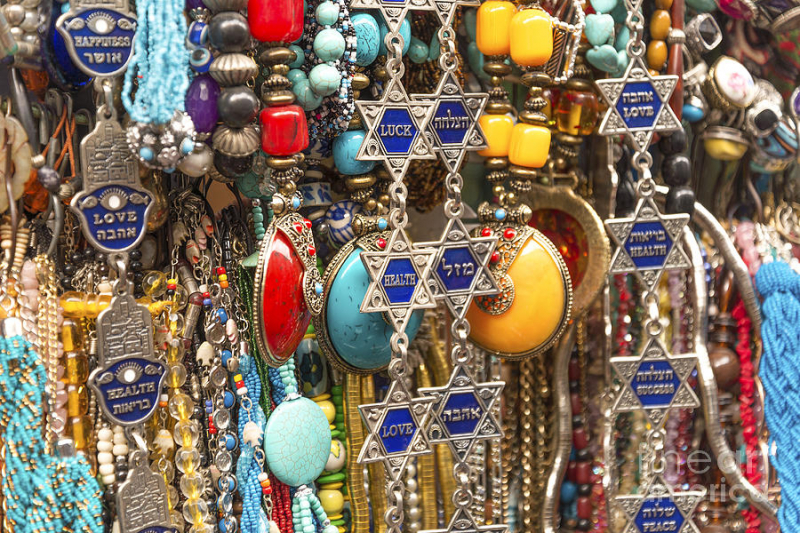Top 7 Israeli Culture, Customs and Etiquette
Should you remove your shoes when visiting friends? Should you greet those on elevators with a smile? When thinking about the dos and don'ts in your own ... read more...nation, these questions might not seem like the most obvious ones, but things that you might not even consider at home can have a major impact abroad. Here is a list of Israeli Culture, Customs and Etiquette.
-
Israelis tend to be informal. The using of first names is customary and promotes a friendly environment. Titles and surnames may be used at the beginning of a meeting in business and formal settings, but very quickly you can switch to personal names. Israelis enjoy talking and are very ready to talk about private matters. Israelis are direct in their speech. Be cautious while discussing delicate political topics like the Holocaust or the Arab-Israeli conflict. Discuss the weather, food, and sports.
Almost no topic of conversation is off-limits. Take a time to comprehend why Israeli and Jewish customs, etiquette, and behavior differ from what you are used to. Israelis are renowned for being straightforward and concise. They will be frank with you about their thoughts and feelings. The perception of foreigners being impolite and aggressive is common. Here's an example: An Israeli native is referred to as a sabra. The prickly pear's fruit, known as a sabra, is rough and pointy on the outside and sweet and pleasant on the inside.
Even in limited areas, Israelis have a tendency to speak swiftly and loudly. This does not imply that they are irate or shouting. When speaking with someone, keep your eyes in theirs.

https://www.indiatimes.com 
https://www.timesofisrael.com/ -
You might bring a hostess gift of some sort when invited to someone's house for a meal. A simple gift like flowers, cake, or chocolates may be used. You might want to think about offering to cook a salad or dessert as part of the meal to lessen the burden on the hosts.
It is customary to bring a sizable gift when you are asked to a meal on one of the major Jewish religious holidays or the High Holidays. It's not uncommon for your hosts to ask you to make one of the main dishes, and doing so will be very helpful to them. Make sure you account for every guest by knowing how many there will be and making plenty.
It is considered appropriate to pay for your plate plus a little extra when you are invited to a friend's wedding and choose to make a monetary contribution. It is acceptable to charge 250–300 shekels each dish as a minimum. There is no restriction on the size of the present you desire to offer, of course. It is appropriate to give a little less money if you are attending a morning wedding (often only on Friday morning). In Israel, wedding registries are nearly unheard of.A present of a household item is typical if you are invited to an engagement party (still rather prevalent in the Anglo community) or a Henna Ceremony (a Moroccan tradition, something akin to a bridal shower conducted a few days before the wedding attended by both men and women). It is customary for family members to present presents of cash and jewelry at henna ceremonies.
Each letter in Hebrew has a specific number. Life, often known as "Chai," has a numerical value of 18. It is also customary and noteworthy to offer gifts of money in multiples of 18. So rather than rounding up to 200 shekels, a symbolic donation may be 180 shekels (10 x 18).
http://fineartamerica.com/ 
https://blog.judaicawebstore.com/ -
Tipping has no set in stone guidelines. Tipping is entirely up to you; if you can, contribute what you can, but in general, follow these rules. In Israel, it is customary to leave a waiter or waitress a 10–15% tip. Check your bill; some restaurants include a service charge, which may be 10% or 15% of the total. You can put the tip on your credit card at several establishments. Although convenient, like in many other nations that provide it, the tip may go to the management rather than the wait staff and servers.
Taxi drivers are not expected to accept tips. Your taxi fare should be pre-negotiated before the trip or decided by a metered rate. It is acceptable to leave a 5 or 10 shekel tip for the worker washing your hair at the hair salon, unless the owner is there.
Even though you are paying for the delivery of your groceries, it is acceptable to leave the delivery person a tip. The top recommendation is 5 to 10 shekels. The magnitude of the gratuity would depend on the delivery's size and accessibility to your home. People who deliver takeout are also tipped. Give what you see necessary. In this case, 5–10 NIS is likewise appropriate.No need to tip the plumber, electrician, or other tradesperson's assistant, but please make sure they have something to drink, especially if it's hot outside. It's also nice to provide a small snack, such as fruit, cookies, or anything similar, especially if the craftsman needs to stay in your house for a while.
Use your best judgment when tipping hotel employees and tour guides in these situations.If someone is delivering an appliance or piece of furniture, do not tip them until they have gone above and beyond for you. For delivery of large products, appliance and furniture stores typically add 200 shekels to your bill at the time of purchase.
A 100 shekel tip per person would be a nice tip for your Aliyah or relocation shipment or container, whether you are moving in or out. It can take several hours to unload, so be prepared with plenty of drink refreshments and a small food to share with them. The bottom line is that you should always feel free to leave a tip if you believe that the service you received was satisfactory.
https://bibleincolor.com 
https://pursuit.ca/ -
Long before Israel's 1948 declaration of independence, the Israelites' culture and traditions were already well established. The Israelites' culture and traditions date back to 1000 BCE as well. The Israelite culture today is a continuation of ancient Israel. It demonstrates the connection between the kingdoms of Israel and Judah. As a result, these two kingdoms had similar traditions and civilizations.
When the Judaism religion first appears in Greek records, it was during the Hellenistic era. On the other hand, there are connections between Jewish culture and the Kingdom of Judah. Jews' traditions and culture can be classified as either secular or religious.
The term "secular Jewish culture" is frequently used to describe a variety of elements, including religion and worldview, media and the arts, architecture and design, Jewish way of life, and customs. Secular Judaism was the source of the Moses Mendelssohn worldview and has some connection to the secularization of Jewish culture.

https://touristjourney.com/ 
https://touristjourney.com -
Dining etiquette is typically informal; "everything is good" when using the fork, knife, and "hand." You should keep in mind that some Israelis may observe kosher for religious reasons by avoiding eating pork, shellfish, or combining dairy and meat. If you are going to a social or business meal, you should do the same.
You can ask your host a question or just do as he says. In Israel, Western utensils are utilized, and eating is done with a fork in the left hand and a knife in the right. You can eat hummus, falafel, sabich, and shawarma with your hands. LeChaim is the Israeli toast for "Cheers," and Beteavohn is the toast for "Bon Appetit."
A mountain of traditional food will probably be presented to you if you are invited to a meal in an Israeli household. Your hosts may provide a selection of roasted nuts, salted sunflower, pumpkin, and other seeds after the meal. It is acceptable to bite down on these, crack the shells between your teeth, and spit the contents into a nearby container. How many nuts and seeds an Israeli family can eat after a meal will amaze you. These nibbles are known as "pitzuchim" in Hebrew.

http://www.thejakartapost.com 
https://thebesttravelplaces.com/ -
Israel has a population that is 77% Jewish, 19% Arab, and 2.1% Christian. The remaining 1.9%, mostly druses and church boxes, are present (2009). According to the 1948 Declaration of Independence, the State of Israel promises complete social and political equality for all of its people, regardless of their race, gender, or religious affiliation. It upholds religious liberty and safeguards the holy sites of all religions within its borders. Israel is a parliamentary democracy that distinguishes itself as a "Jewish" state by allowing any Jew who wishes to immigrate.
The political hostility between Jews and Arabs has a negative impact on relations between the various religion communities because the large majority of Muslims and Christians are from the country's Arab population. The religious discourse between Jews, Christians, and Muslims has been attempted more lately.
Men should wear a kippah or cap, while women should cover their shoulders and knees. Sunday through Thursday are the working days. Jewish holy day Shabbat is observed from 3 p.m. on Friday until 7 p.m. on Saturday. Hebrew is the official language; other widely used languages include Arabic, English, French, and Russian.

https://www.bing.com 
http://il.boell.org/ -
Israelis are vivacious, direct, and occasionally boisterous. Hand gestures are frequently used. Hugging, touching, and kissing are quite popular. The customary greeting is a handshake. In comparison to North America and Europe, personal space is much smaller in Israel. Israelis will touch your arm or shoulder while you're talking. Always smile; Israelis enjoy positive energy and are prone to responding to a positive, tranquil environment. Always be happy.
The dress code is informal and laid back. The climate in Israel is really pleasant. Winter is not particularly long or chilly. The heat of the summer. Autumn and springtime are ideal. Suits are not frequently worn; they are typically seen at formal gatherings, conferences, and legal offices. It is advised to check the dress code for the specific company you are visiting if you are traveling for business (it may be casual or business casual). If you're a visitor, have fun, unwind, and come.


http://www.ibtimes.co.uk/




























